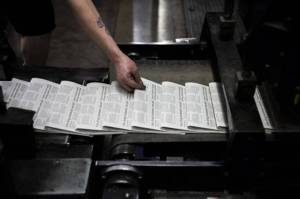Comment: As covid wanes, expect its political battles to grow
Published 1:30 am Tuesday, March 2, 2021
By Daniel W. Drezner / The Washington Post
The trend lines for U.S. emergence from the pandemic this spring look very promising. After a storm-related lull, vaccinations are ramping up to nearly 2.5 million shots a day. There is every reason to believe that number will increase in March. The Food and Drug Administration’s emergency use authorization of the Johnson & Johnson single-shot vaccine immediately unlocks another couple million doses of available vaccine.
By the end of March, Moderna, Pfizer and Johnson & Johnson have pledged to have a combined 240 million doses available for Americans. Add that to the number already vaccinated (and those recovering from covid-19 and therefore also immune) and suddenly talk about being “at an inflection point” starts to feel real.
So … is that it? By May, 14 months after the pandemic transformed our daily lives, will it be “pretty much the ballgame” in this country?
I have my doubts. Never underestimate the ability of 21st-century Americans to politicize something, even ridiculously good news. This past week there was a contretemps about vaccine selfies, for Pete’s sake.
The more serious reason is that there remain some fundamental uncertainties about America’s exit strategy from pandemic life. These uncertainties will likely produce two serious political cleavages as the weather warms up. The first will be the growing divide between the vaccinated and those resisting vaccinations. The second will be the gap between risk-averse public health officials and everyone else.
The good news on this is that over the last six months, the percentage of Americans interested in getting vaccinated has increased. The bad news is that there remains a rump group of people who seem adamant about not getting vaccinated. As Axios’s Bryan Walsh reported last week, some of this is political. In a recent Surgo Ventures poll, 17 percent of respondents “were conspiracy believers who tended to be Republican and had little fear of covid-19 itself. They often subscribed to more outlandish and harmful theories about vaccines.”
If everyone else in the country but the Trump rump gets vaccinated, it seems like herd immunity could still be achievable. But as the New York Times’s Jennifer Steinhauer recently reported, resistance to vaccination permeates institutions like the U.S. military as well: “When it comes to taking a coronavirus vaccine, many troops — especially younger enlisted personnel as opposed to their officers — see a rare opportunity to exercise free will.”
That this resistance skews young is unsurprising. We know that covid-19 disproportionately harms older people. From the perspective of a young person who might be ambivalent about getting a shot, receiving this vaccine might seem unnecessary.
The tough issue here is that, much like staying home or mask-wearing, a significant benefit of getting vaccinated is to protect other people. The more Americans who get vaccinated, the less likely the disease can spread. This includes younger people who think of themselves as relatively safe even if they catch it.
Persuading this demographic to get vaccinated, not just for their self-interest but for the national interest, will be a heavy lift. The WHO acknowledges that “the proportion of the population that must be vaccinated against covid-19 to begin inducing herd immunity is not known.” Dr. Anthony Fauci has acknowledged raising his estimate of the percentage needed to be vaccinated multiple times. Some conservative commentators believe that the threshold level is lower than the fraction of Americans resistant to getting vaccinated. This sounds like the perfect amount of uncertainty to generate fierce political debates well into the summer.
The other divide that will dominate the country is the battle between risk-averse public health officials and, well, everyone else. Last March, Fauci said presciently, “If it looks like you’re overreacting, you’re probably doing the right thing.” As the country wants to start returning to normal, public health officials will start sounding like Cassandras. They will warn about the worst-case scenarios of vaccine-resistant strains dragging the country back into social-distancing hell in the second half of the year.
As we start to emerge from the pandemic, there should be an honest discussion about balancing risks. The problem is that, to paraphrase George Carlin, anyone taking more covid-19 precautions than you is an idiot and anyone taking fewer precautions is a maniac.
Fauci and President Biden have been more cautious than most. Perhaps that should change. The Atlantic’s Zeynep Tufekci has had as good a pandemic as any public intellectual out there, and her recent essay on the mistakes we keep making gets at the need for more frankness about the trade-off of risks:
“Sometimes, experts and the public discussion failed to emphasize that we were balancing risks, as in the recurring cycles of debate over lockdowns or school openings. We should have done more to acknowledge that there were no good options, only trade-offs between different downsides. As a result, instead of recognizing the difficulty of the situation, too many people accused those on the other side of being callous and uncaring. …”
Since the vaccines were announced, too many statements have emphasized that we don’t yet know if vaccines prevent transmission. Instead, public-health authorities should have said that we have many reasons to expect, and increasing amounts of data to suggest, that vaccines will blunt infectiousness, but that we’re waiting for additional data to be more precise about it. That’s been unfortunate, because while many, many things have gone wrong during this pandemic, the vaccines are one thing that has gone very, very right.
Because there are genuine trade-offs in risks, there will be genuine grounds for debate. That uncertainty will feed the politics of covid-19 for the rest of 2021.
Daniel W. Drezner is a professor of international politics at the Fletcher School of Law and Diplomacy at Tufts University and a regular contributor to PostEverything.


